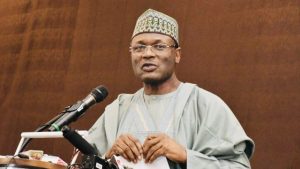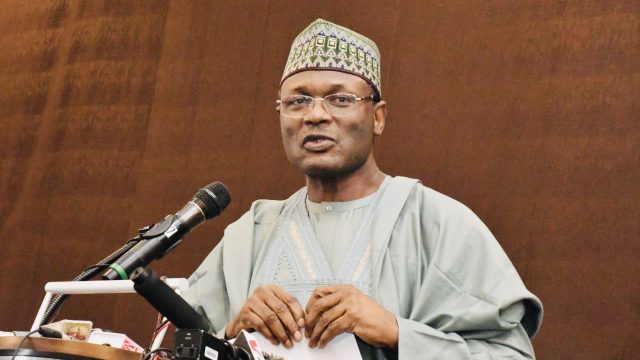
Lots of lessons learnt from Feb. 25 Presidential, NASS Elections— INEC Chairman
ABUJA— The Independent National Electoral Commission (INEC) says a lot of lessons have been learnt from the conduct of the Feb. 25 Presidential and National Assembly Elections in the country
INEC Chairman, Prof. Mahmood Yakubu, disclosed this at a meeting with the Resident Electoral Commissioner (RECs) in Abuja on Saturday.
Shadanpamarepoters reports that the meeting also had in attendance INEC’s National Commissioners, directors and other management staff of the commission.
Yakubu said that the meeting was the third in less than two months to review performance and assess preparations for the March 11 Governorship and House of Assembly elections.
“Like the last two meetings, the purpose is to discuss the conduct of the 2023 General Election. Arising from the Presidential and National Assembly elections held a week ago, and with the Governorship and State Assembly elections holding next week, it is imperative to review performance and assess preparations.
“No doubt, last week’s national elections raised a number of issues that require immediate, medium, and long-term solutions. The planning for the election was painstakingly done. However, its implementation came with challenges, some of them unforeseen.
“The issues of logistics, election technology, behaviour of some election personnel at different levels, attitude of some party agents and supporters added to the extremely challenging environment in which elections are usually held in Nigeria.
“We appreciate the sacrifice and doggedness of Nigerians and the dignity and maturity displayed by political leaders even in the context of divergent views about the election. A lot of lessons have been learnt,” he said.
According to the INEC boss, of immediate concern to the Commission is how the identified challenges can be addressed as the umpire approaches the concluding phase of the General Election involving the largest number of constituencies i.e. 28 State Governorship elections and 993 State Houses of Assembly seats.
He said that in last Saturday’s elections, winners had also been declared for 423 national legislative seats while supplementary elections would be held in 46 constituencies.
“In the Senate, 98 out of 109 seats have been declared. So far, seven political parties have won senatorial seats while in the House of Representatives, 325 out of 360 seats have been won by eight political parties.
“In terms of party representation, this is the most diverse national assembly since 1999,” he added.
According to him in the Senate, APC wonr 57 seats, APGA (1), Labour Party (six), NNPP (2), SDP (1), PDP (29) and YPP (1)
He said that for the House of Representatives, APC won 162, ADC (2), APGA (4), Labour Party (34), NNPP (18), PDP (102), SDC (2) and YPP (1).
He said that Certificates of Return would be presented to Senators-elect on Tuesday, March 7 at 11.00am at the National Collation Centre (the International Conference Centre), Abuja.
Yakubu said that Members of the House of Representatives-elect would receive theirs on Wednesday March 8, 2023, at 11.00am at the same venue.
“However, for effective crowd management, each Senator/Member-elect should be accompanied by a maximum of two guests. The comprehensive list of all members-elect will be uploaded to the Commission’s website shortly,” he added.
Calling on the RECs to work harder ahead of the polls, Yakubu said that they would be held responsible for any failure.
“As we approach the Governorship and State Assembly elections, we must work harder to overcome the challenges experienced in the last election. Nothing else will be acceptable to Nigerians. All staff found to be negligent, whether they are regular or ad hoc officials, including Collation and Returning Officers, must not be involved in forthcoming elections. RECs must also immediately initiate disciplinary action where prima facie evidence of wrongdoing has been established.
“Election Day logistics must be finalised days before the election and handled by the Electoral Officers (EOs) at Local Government level. This has been our standard practice. Centralising the process as was done in some States resulted in delayed deployment of personnel and materials and late commencement of polls.
“RECs will be held responsible for any tardy arrangement or the failure to deploy electric power generators to collation centres or polling units where such facilities are needed. The Commission has enough facilities in all the States of the Federation. Failure to deploy them is simply inexcusable.
“Refresher training must be conducted for ad hoc staff that participated in the last election. Where they are replaced for good reason, they must be properly trained so that processes are not delayed or compromised at any stage.
“Arising from last week’s election, the Commission has received reports from our State offices well as complaints and petitions from political parties and candidates. Where infractions of any kind are proven, there will be redress.
“I must add that any action taken by the Commission is without prejudice to the rights of parties and candidates to seek further remedy as provided by law,” he said.
On Election Day technology, Yakubu restated that the Bimodal Voter Accreditation System (BVAS), would again be deployed for voter accreditation and result management.
He stressed that the deployment of BVAS had gone a long way to sanitise voter accreditation as could be seen from the result of recent elections.
According to him, since last week, the Commission has intensified the review of the technology to ensure that glitches experienced, particularly with the upload of results are rectified.
“We are confident that going forward the system will run optimally,” he said.
Yakubu said that that the Commission would like to appreciate the patience and understanding of Nigerians.
He added: “We do not take this for granted. We equally appreciate the patriotism of political, traditional, religious and community leaders that appealed for calm.
” Similarly, the Commission appreciates the role of heads of election observation missions, some of whom are still in the country.
“We appeal to such missions to consider extending their observations to the Governorship and State Assembly elections not only because they form an integral part of the General Election for which they are accredited but also because they are as important as the national elections.
“In the same vein, the Commission appreciates all domestic observers for their preliminary reports which will help us enormously as we conclude the 2023 General Election. We look forward to the full reports.
“We similarly appreciate the media for the extensive coverage of the election and the analyses by informed Nigerians and friends of Nigeria on the processes.
” We wish to assure you that we will continue to engage with you and all segments of the Nigerian society in a comprehensive, multi-stakeholder review of the election in earnest.” (Shadanpamarepoters)




